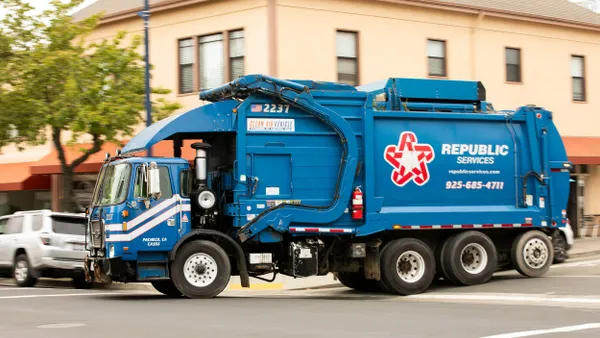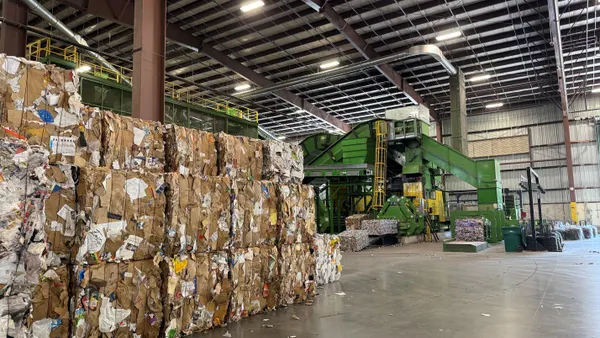Each day, the Waste Dive team rounds up in our Daily Digest news, insights and moments from around the industry you may have missed.
SAFETY SEMANTICS
Earlier this summer, NWRA President and CEO Darrell Smith made a comment about collection safety that caught our attention.
"We're of course very supportive of privatizing all that work. Because we do a better job, we're more efficient, we're safer," he said on a podcast called Through the Noise.
Bureau of Labor Statistics (BLS) data from 2016, and unofficial SWANA data from 2017, show the majority of fatal incidents happen on the private side. When asked, NWRA shared a previously unreleased response which took issue with a perceived "negative implication" that makes private companies "look like they are the problem." The document notes, "It would stand to reason that the private sector would have a proportionate number of incidents" because the majority of industry employees are in that category.
BLS data show injury incidence rates for the "refuse and recyclable material collector" occupation have historically been much higher for public sector workers than private. The same holds for an industry-level view of the "waste management and remediation services" category. A similar breakout of fatality incidence rates isn't readily available.
Though, anecdotally, it's also worth noting some public sector workers may be more likely to do rear-load residential collection routes which can have more exposure to potential hazards. Reporting rates may also be higher among unionized employees — more common in local governments — and lower on the private side. Temporary workers may also not be recorded in the same occupation categories. Many of the private sector incidents also happen among smaller, local companies that are less likely to be NWRA members or have the need for a large safety program.
Readers can review the original April SWANA press release and draw their own conclusions about its framing, but the bottom line moving forward is all involved agree with the goal of improving safety across the industry.
"We will continue to provide useful safety information and training to everyone in the industry, big or small, public or private," wrote SWANA Executive Director and CEO David Biderman via email. "Our new Hauler Outreach initiative reflects our current focus on reducing safety hazards at smaller haulers."
NWRA also noted its ongoing "Safety Mondays" email update, as well as regular "Safety Stand Downs" and Slow Down to Get Around advocacy that is another shared industry priority.
IN OTHER NEWS
After hitting sanitation employee, man gets year probation — U.S. News & World Report
Court records indicate Dennis Stenner knocked over Jesse Witzke during an argument in Papillion, Nebraska, a suburb of Omaha. He pleaded no contest to third-degree assault charges and is sentenced to complete 20 hours of community service. According to witnesses, Stenner was angry at the truck driver for blocking the street. Cell phone video shows him driving his SUV into the worker after he was asked to move. Stenner claims his vehicle accidently shifted into drive as he was backing up to get out of the way. Many states continue to pass "Slow Down to Get Around" laws as a measure to help protect workers from such incidents.
Rubicon Global announces 'Waste Fit Champions' initiative — Sustainable Brands
Rubicon is partnering with Sustainable Brands, the University of Pennsylvania’s Wharton Initiative for Global Environmental Leadership, and Goodr to name companies that are reducing waste and employing circular economy best practices. Emphasis is placed on achieving "zero waste" and a closed-loop waste system. Winners will be announced at Sustainable Brands’ New Metrics 2018 conference in October at The Wharton School. Separately, Goodr just announced that it has received $1.25 million in pre-seed funding.
WestRock appears unlikely to sell paper mill in Oregon anytime soon — Portland Tribune
The Atlanta-based owner of a Newberg paper mill has continued cat and mouse games with two potential buyers. In June, the company said it was "open to all options" for sale of the facility, but representatives from both Indian and Chinese corporate entities haven't made any progress in closing a deal. Restarting the mill is viewed by many in the region as a way to boost the local recycling industry by opening up a new local end market.
Manchester, New Hampshire eyes automated collection expansion — New Hampshire Union Leader
After assessing the outcome of a one-year pilot program — with no injuries reported by automated truck operators — officials say the successful program may expand to include two-thirds of the city. The main reason the city decided to begin the test program was worker safety; Manchester loses around 4,500 work-hours per year to injuries, amounting to $298,310 per year in workers' compensation from 2015-2017. As many collection companies look for solutions to worker shortages, automation could have the added benefit of higher employee retention rates if the job can be made safer.
TRASH WORLD
Norwegian waste management company to use BHS' FiberPure system — BHS
Norsk Gjenvinning will use the automated visual inspection system to monitor processing of 20 metric tons per hour at its new Oslo paper recycling system beginning in 2019. The company processes around 25% of Norway's waste stream and also imports waste from Sweden, Denmark and the U.K. MRF operators in the U.S. have used similar technology from BHS at facilities in Berkeley County, South Carolina and Monterey, California.
ON THE AGENDA
- 1 pm EST — Webinar: Improving Recycling Quality at Colleges and Universities
RecyclingWorks in Massachusetts, the Massachusetts Department of Environmental Protection, and Casella Waste Systems will discuss how to improve recycling quality and reduce contamination at on campuses. Register here.
- 2 pm EST — Webinar: How Commercial Glass Recycling Programs Are Thriving
The Glass Recycling Coalition and the Municipal Waste Management Association will share first-hand accounts from communities and companies that have successfully managed glass recycling programs to increase recycling and diversion rates. Register here.
- 2 pm EST — New York City Councilmember Antonio Reynoso and Council Speaker Corey Johnson join Mayor Bill de Blasio for the signing of Intro. 157, a transfer station capacity bill in Brooklyn.
Do you have events or webinars that should be on our agenda this week? Email waste.dive.editors@industrydive.com.










